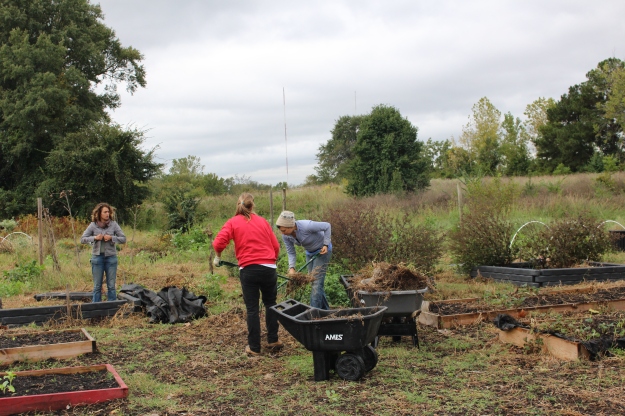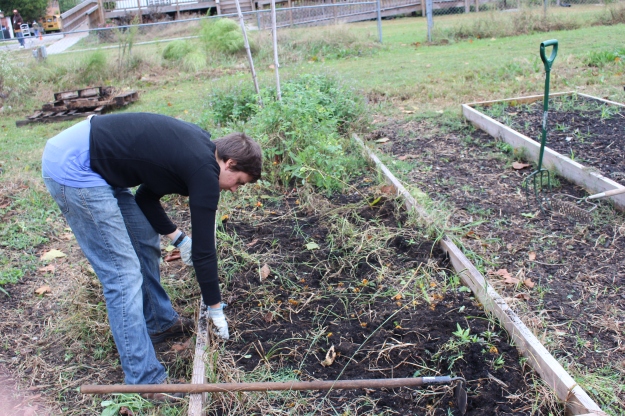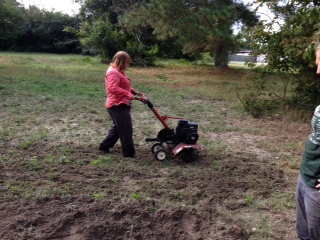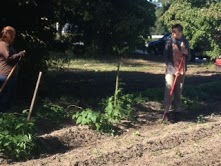
Farm Manager Marisa and new apprentices Kayla and Caroline at work in Dillard Academy school garden!
The change of the seasons has brought a new group of apprentices to the Small Farm Unit! Fall is a time of transition on the farm: the days are getting shorter, mornings are chilly, and the whole landscape of the farm changes from summer to fall production, scaling down in size, and planting brassicas and other cold hardy crops, like cabbage, collards, spinach, beets, lettuce and broccoli. Two new figures emerge in the changing Small Farm landscape- myself, Caroline, and Kayla. We are the winter apprentices and plan to stay on the Small Farm until March. Mary Claire and Kellyn, the summer apprentices, departed last week, but Kayla and I were lucky to spend the first three weeks of our experience learning from them and sharing adventures.
I was attracted to the Small Farm apprenticeship for many reasons. I have had a lot of previous farm experience as a laborer, and the farmers that I have worked for have all been eager to teach me what they could. However, on a market or CSA farm, the priority is to harvest and prep the produce, and any learning takes place around that schedule. After all the practical, in-field experience I have gained, I felt I needed more education before feeling comfortable farming on my own, a goal I hope to achieve in the next couple years.
Our experience so far could be characterized in the same way as a good farm- diverse and full of life. Almost every day of the work week we are in a different location, doing something different and interacting with different people. In this first post, I hope to highlight some of what we have done in our first few weeks, and explain further what our apprenticeship is about.
Daily Happenings at Small Farm:
On most days we will spend at least a portion of our time working at the Small Farm Unit, and this is where our energy is most concentrated. There has been a lull in production in our first weeks here as we transition to fall crops, but now our fall field is planted, an effort that required weeding, fertilizing, setting up drip irrigation, and putting in our crops as seeds or transplants.
Unlike on a production style farm, our labor on the farm is focused on learning a diverse group of skills. I have worked on production farms for several years now, but there are many farm skills I haven’t acquired. Since coming to the Small Farm, I have had my first experiences with setting up a drip irrigation system in the field, driving tractors and using implements for different tasks (which Kayla and I both especially enjoy), planting cover crops, and taking soil samples to be sent to the state labs for nutrient testing before we plant next spring. This has really made my experience so far, to be able to take part in all the tasks required to manage a small farm.
We also have lectures and readings on topics related to both small scale agriculture and the financial and marketing side of running a small farm. We have specifically been examining holistic farm planning, and this model has Kayla and I thinking about how being small farmers fits into the goals that we want for our lives not only in terms of work and money, but also in terms of our values and quality of life choices. Discussing and reading about these topics helps me really think deeply about farming, all of the different ways it can be done, and which ways are best for my resources and my goals in life.
Research at Small Farm
Researchers from NC A&T and NC State universities conduct research out here at the Small Farm, and right now we are working on a tomato study being done in our high tunnels about nutrient uptake. We are comparing how productive hot house tomatoes are when given different nutrient treatments, planting into areas that have first been planted in cover crops, or organic fertilizer or compost has been spread. We are recording data for this study and managing the plots, and have had the chance to talk with the researcher from A&T heading up the project and what its significance is.
Dairy: Milking and Calves on the Way
Kayla and I both expressed interest in working with animals when we came to the Small Farm. We do have chickens and four beef steers grazing at the Small Farm that we include as part of our yearly rotation of fields and pastures. We also have had the chance to work at the Sustainable Dairy unit that is also a part of Cherry Farm. For me, that has meant getting up around 4:30 am a couple days a week to help with morning milking! We had the option to choose morning or afternoon shifts, but I really wanted to experience what the dairy lifestyle was like.
It has been amazing, and I come away from my experience each time with a smile on my face. The employees at the dairy have been eager to share their wealth of knowledge with us, and by my second day working there, I was less timid around the animals and felt like part of the team, urging the cows into the milking stalls, and hooking them up to the machines. About the time we are done milking the cows, the sunrise is spreading an orangey glow across the horizon out beyond the pastures, which are often cloaked in morning fog.
Right now is the season for calving, and calves are now coming on, with about ten so far, and 130 total expected. I was with the guys at the dairy when a new calf was discovered one morning, and got to see the whole procedure for processing new calves. Part of my role included holding the new born! The calves are fed in the morning, and I have gotten to bottle feed new calves as well.
Community Work in Goldsboro
Our community work is also another reason I was interested in this apprenticeship, and Kayla and I have become acquainted with many of the exciting projects happening in Wayne County. We have also had the chance to work in the soil with the amazing people that are making several community gardens happen. The Freedom Farm is an effort by several local ladies to farm land donated for the purpose by the city. The goal is to teach agricultural skills to young women in the community in the hopes that they can create entrepreneurial opportunities for themselves. It has been interesting talking to these ladies about how farming skills, which were such a big part of their young lives, have been lost to younger generations as the rural landscape has changed.
For my community work, I plan to work mostly with our local Food Corps volunteer, Leslie, who is working at Dillard Academy in Goldsboro as a nutrition and local food educator, as well as a school gardener. Being able to do all of these things well requires a lot of time, so I hope to assist Leslie in planting and maintaining the garden, and also creating educational opportunities for the kids in the garden and in the classroom, learning about eating and growing fresh fruits and vegetables. We have spent a few work days volunteering out in the Dillard garden, and it has already come a long way!
I am so glad to be working with CEFS, and already feel like I have learned so much! I feel very fortunate to have this opportunity, and beyond what I have written about here, we are also learning from local beekeepers, and going to workshops around the state about agricultural topics that interest us! I am looking forward to learning many more things, and sharing them with all of you here on this blog!
-Caroline



